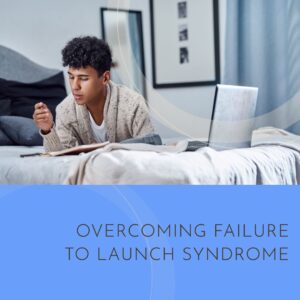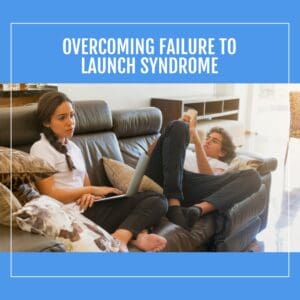There are many parents, like you, witnessing their young adult children grappling with an often-unaddressed issue – Failure to Launch Syndrome. This phenomenon can be quite perplexing and disheartening, affecting both the child and their family. However, understanding its roots, recognizing the signs, and learning about the available resources can pave the way for successful resolution, independence, and growth.
Clinically Reviewed by:
Dr. Vaughn Heath, is a respected Marriage and Family Therapist from Alberta, Canada. His extensive career includes work with trauma victims, a co-founding role at Second Nature Wilderness Programs for teens, and launching The Arise Society to aid young adults in transitioning from treatment to everyday success. His work also extends to autism, and his personal journey with ADHD and mindfulness enhances his compassionate medical practice.

Disclaimer: While we’ll be referring to “Failure to Launch” as a syndrome throughout this article for the purpose of discussion and understanding, we would like to clarify that it is not officially recognized as a diagnosis in the Diagnostic and Statistical Manual of Mental Disorders (DSM). The references, ideas, and thoughts shared here are meant to enhance awareness and are not a substitute for professional mental health advice or treatment. If you or someone else needs support, please reach out to a qualified mental health professional.
II. Symptoms of Failure To Launch Syndrome
Identifying the symptoms of Failure to Launch Syndrome can be challenging due to their subtlety and overlap with common adolescent behaviors. Yet, a keen eye and empathetic understanding can reveal these indicators and catalyze the journey toward effective intervention.

A. Low Motivation
A telltale symptom is a lack of motivation. This low drive can manifest in multiple areas of life, such as academics, job search, or personal development. It can often lead to a sense of stagnation, where the young adult seems to be “stuck” without any apparent progress.
B. Little to No Ambition
An associated sign is a lack of ambition or a clear sense of purpose. The young adult may exhibit indifference towards setting life goals, pursuing career paths, or striving for self-improvement. This can often present as an apparent disregard for future planning.
C. Poor Work Ethic
You might also notice a poor work ethic, including low punctuality, lack of dedication, or disinterest in responsibilities. This trait can significantly affect their professional growth and success.
D. Lack of Life Skills
One key symptom of this syndrome is a deficiency in essential life skills, such as cooking, cleaning, or budgeting. Without these skills, the prospect of independent living can seem daunting, further exacerbating the syndrome.
E. Indecisiveness
Indecisiveness can be a significant barrier to moving forward. The young adult might struggle with making choices, leading to inaction and a further sense of being “stuck”.
F. Narcissistic Tendencies
While not always present, some young adults may display narcissistic tendencies, focusing predominantly on their needs while disregarding others.
G. Low Frustration Tolerance
The young adult may have a low tolerance for frustration, reacting disproportionately to setbacks or difficulties, leading to emotional volatility and conflict.
H. Lack of Accountability
There might be a lack of accountability, where the young adult struggles to take responsibility for their actions, often blaming others or circumstances for their predicament.
I. Procrastination
Procrastination is a common symptom, where tasks or decisions are persistently delayed, contributing to a stagnant lifestyle and potential conflicts.
J. Difficulty Managing Stress
Young adults may experience challenges managing stress, leading to emotional distress and further reluctance to venture into new territories. You can learn more about this on our post on handling stress.
K. Isolation
Finally, the young adult may exhibit social isolation, pulling away from friends, family, or social activities. They might prefer to remain in their comfort zone, leading to a feeling of disconnect and loneliness.
Identifying these symptoms is the first critical step toward understanding and addressing this concern. In the next section, we’ll delve into the possible causes behind these symptoms, providing a deeper understanding of this syndrome.

III. Common Causes of Failure To Launch Syndrome
Failure to Launch Syndrome can stem from various causes, often complex and interconnected. Understanding these potential origins is crucial for implementing effective solutions.
A. Developmental Disruption/Trauma
Traumatic experiences or developmental disruptions during a person’s formative years can contribute significantly to their difficulty in transitioning to adulthood. This trauma might include loss, abuse, neglect, or significant life changes that affect their emotional and psychological growth.
B. Helicopter Parenting
Overprotective or “helicopter” parenting can inadvertently hinder a young adult’s development of independence. The child might grow overly reliant on their parents for decisions and support, stunting their self-efficacy and problem-solving skills.

C. Mental and Developmental Disorders
Mental health challenges like anxiety, depression, or ADHD, can be contributing factors.. Such conditions might impede motivation, social interaction, or decision-making skills, presenting obstacles to independence.
D. Borderline Personality Disorder
Borderline Personality Disorder can cause emotional instability, impulsivity, and strained relationships, potentially leading to the inability to transition into self-reliant adult life.
E. Autism
Autism can contribute to Failure to Launch Syndrome due to its impact on social interactions, communication, and behavior. Young adults with autism often struggle with key aspects of adult life such as employment, finances, and independent living. They may prefer familiar routines and find the transition to adulthood daunting. With appropriate interventions and support systems, like those offered by The Arise Society, individuals with autism can make significant improvements toward transitioning into independent adulthood.
Also, it’s important to note that every individual on the autism spectrum is unique, and the degree of the challenges faced can vary widely.
F. Life Challenges
General life challenges such as academic pressure, peer pressure, or career confusion can overwhelm young adults, possibly causing a retreat into the familiarity and safety of their childhood home.

G. Perfectionism
Perfectionism can lead to a fear of failure, which might inhibit the young adult from taking necessary risks or pursuing independent life goals.
H. Poor Social Skills
Poor social skills can lead to isolation and a lack of peer support, hindering the social development essential for a successful transition into adulthood.
I. Entitlement

J. Low Self-Esteem
Low self-esteem can lead to self-doubt and fear of rejection, both of which can impede a young adult’s motivation to seek independence.
K. Not Addressing Underlying Mental Health Challenges
Ignoring or not properly addressing mental health challenges can exacerbate the syndrome. Without the right support or treatment, these challenges can pose significant barriers to a successful transition to adulthood.
Remember, recognizing these potential causes can provide valuable insight into a young adult’s struggle. It empowers us to address the root issues effectively rather than merely managing the symptoms. In the next section, we will explore various strategies for overcoming this syndrome.
IV. Strategies to Overcome Failure To Launch Syndrome
To overcome the challenges posed by the Failure to Launch Syndrome, it’s important to take a proactive, constructive, and collaborative approach. Here are some strategies that can make a positive difference.
-
Parents Can Reach Out to Mental Health Professionals
Seeking the guidance of mental health professionals can be highly beneficial. These experts can provide personalized strategies and therapeutic support to help the young adult transition into a more independent life. Our dedicated staff at The Arise Society is happy to talk on the phone with you about your unique situation. Call (801) 300 – 9995
-
Transitional Living Programs for Failure to Launch Syndrome
Transitional living programs like those offered by The Arise Society provide a structured environment that fosters independence. They offer academic, therapeutic, and social support tailored to the individual’s needs.
-
Individual, Family, and Group Therapy
Therapies provided in transitional living programs can help address underlying psychological issues, improve social skills, and foster resilience. They also offer a safe space for young adults to share their experiences, feelings, and fears. Individual therapists in your area are also a good resource to reach out too for guidance.
-
Living Skills Checklist
Creating a living skills checklist can provide a roadmap for independence. This can include skills such as house management, financial preparedness, job search skills, cooking, and communication skills. Performing acts like this can help stir up ideas and curiosity for your young adult. Though not a solution by itself, it can be an enjoyable activity to get the ball rolling.
-
Vision Board and Actionable Items
Another great activity is creating a vision board. This can help define and visualize future goals. Discussing actionable items related to each goal can further empower young adults to take charge of their life. Try creating your own vision board alongside your young adult instead of focusing solely on their vision board.
-
Developing a Support System
Encouraging young adults to develop a supportive network of peers, mentors, and professionals can give them a sense of belonging and additional resources for overcoming challenges.
The Arise Society transitional living center cultivates a strong social support system for young adults. The environment encourages meaningful relationships with peers undergoing similar experiences, fostering camaraderie and mutual understanding. Mentors provide practical guidance, helping students set and reach achievable goals. The collective growth mindset of The Arise Society promotes emotional intelligence and interpersonal skills, vital for adult life. This supportive network empowers students, giving them the tools to overcome and flourish in adulthood.
The Role of Therapy in Overcoming Failure to Launch Syndrome
Therapy plays a pivotal role in navigating and overcoming the challenges students and family face. Here’s how:
A. Therapy Provides a Safe and Supportive Environment for Self-Exploration
Therapy offers a judgment-free, safe space where young adults can explore their feelings, experiences, and fears. With the guidance of a professional, they can gain a better understanding of themselves, their challenges, and their potential.
B. Individual Therapy Helps Identify Underlying Issues and Develop Coping Strategies
Individual therapy can help identify the underlying mental health issues or developmental disorders that may be contributing to a young adult’s struggle. It also assists in developing effective coping strategies, enhancing resilience, and building essential life skills. Check out our article on handling criticism for a glimpse of the practical skills one can develop in therapy.

C. Family Therapy Fosters Healthy Communication and Addresses Enabling Behaviors
Family therapy can be extremely helpful. It encourages healthy, open communication among family members, and helps to identify and rectify any enabling behaviors that might be hindering the young adult’s progress towards independence.
D. Group Therapy Offers Peer Support and a Sense of Belonging
Group therapy provides a supportive community where young adults can connect with peers who are facing similar challenges. This peer support can offer a unique sense of belonging and shared understanding, which can be incredibly therapeutic. At the Arise Society, our students occupy a community of two-bedroom apartments. They participate in group therapy sessions as well as group activities outside the facility grounds. Our article on the importance of group therapy in healthy character development further highlights the value of this approach.
Therapy is a powerful tool that can empower young adults to navigate the complex journey from adolescence to adulthood successfully. In the following section, we will explain how The Arise Society can provide this essential support.
VI. How Can The Arise Society Help with Failure to Launch Syndrome?
At The Arise Society, our mission aligns perfectly with the needs of those dealing with Failure to Launch Syndrome. We believe in the power of individualized therapeutic, academic, and social support for young adults as they navigate the journey from adolescence to adulthood.
A. Individualized Therapeutic, Academic, and Social Support
Our approach centers on providing an immersive, dynamic community for our students. Here, they are offered tailored support that responds to their unique needs and aspirations. We don’t just focus on academic triumphs. Instead, we promote holistic growth by instilling self-belief, nurturing self-reliance, and fostering enriching, lifelong interpersonal relationships.
A. Individualized Therapeutic, Academic, and Social Support
Our approach centers on providing an immersive, dynamic community for our students. Here, they are offered tailored support that responds to their unique needs and aspirations. We don’t just focus on academic triumphs. Instead, we promote holistic growth by instilling self-belief, nurturing self-reliance, and fostering enriching, lifelong interpersonal relationships.
Cultivating Resilience, Instilling Curiosity, and Awakening Potential
In every student, we see untapped potential and promise. We believe in building successful students, mature, compassionate communicators, and lifelong learners. We work diligently to cultivate resilience, instill curiosity, and awaken this hidden potential. Our program is designed to empower our students, equipping them with a robust sense of self that doesn’t just survive but thrives, well into adulthood. Check out our article on motivation and mental health for more insights into how we foster resilience and curiosity.
C. A Nurturing Environment
Our location at the base of Mount Timpanogos in Orem, Utah is not just a city—it’s a launchpad for our students’ boundless futures. With its vibrant fusion of natural beauty, cultural richness, and innovative spirit, Orem provides an ideal environment for The Arise Society. Here, students can flourish in an atmosphere that naturally inspires growth, learning, and transformation.
At The Arise Society, we stand alongside our students as they leap into the future, giving them the wings to soar higher than ever before. Whether it’s navigating the complexities of college life or the broader challenges of adulthood, we’re here to support every step of the journey.
VII. The Importance of Self-Care for Family Members
Caring for an adult child with anxiety, autism, depression, or other mental health challenges can be exhausting and feel endless. As we navigate these challenges together, we must acknowledge the importance of self-care for parents. Here’s why self-care should be a priority.
A. Prioritizing Self-Care for Emotional Well-being
As a caregiver, it’s crucial to maintain your own emotional well-being. You can’t pour from an empty cup; taking care of yourself ensures you’re in the best position to support your loved one. Self-care involves activities that contribute to your overall wellness and might include activities like exercise, meditation, hobbies, or simply taking time to rest and relax. You have a life apart from your children and it is not selfish to attend to your own wellbeing. By taking care of yourself, you’ll be better equipped to take care of your family too.
B. Setting Healthy Boundaries
Self-care also involves setting healthy boundaries. It’s important to remember that while you want to support your loved one, it’s not your responsibility to solve all their problems. Setting boundaries can help prevent caregiver burnout and ensure a healthier relationship with your loved one.
C. Seeking Support
Don’t forget that you’re not alone. There are support groups and counseling services available for families dealing with Failure to Launch Syndrome. These resources can provide emotional support, practical advice, and a sense of community. Speaking with others who are going through similar experiences can provide a unique source of comfort and understanding.
D. Encouraging Open and Non-Judgmental Communication
Open and non-judgmental communication can go a long way in supporting your loved one. This involves creating a safe space where they can express their feelings and concerns without fear of judgment or criticism. It allows for mutual understanding and fosters a stronger relationship.
E. Collaboration is Key
Finally, it’s essential to understand that this is a collaborative effort. The journey might be challenging, but the process can be much smoother when the entire family is involved and has the necessary professional support.
Prioritizing your well-being allows you to show up as a more present, empathetic, and effective support system for your loved one.
Conclusion
A. Recap of the Importance of Understanding Failure to Launch Syndrome
This is a complex and challenging situation for young adults and their families. Understanding the symptoms, common causes, and potential strategies for overcoming this syndrome is crucial. From low motivation and indecisiveness to technology addiction and poor social skills, there are several indicators that could suggest the need for treatment.
It’s important to note that this syndrome often has underlying causes, such as developmental trauma, mental illness, and enabling parenting styles. Recognizing these causes is the first step towards addressing them effectively.
B. Encouragement to Seek Help and Support
This is not a journey that you or your loved one has to go through alone. Reach out to mental health professionals, join group therapies, or consider specialized programs such as those offered by The Arise Society. Therapeutic interventions, skills training, and supportive environments can make a significant difference in helping young adults navigate their transition to independence.
The Arise Society, situated amidst the picturesque landscape of Orem, Utah, provides an enriching environment for young adults to explore their potential, build life skills, and prepare for their future. We offer individualized therapeutic, academic, and social support tailored to each student’s unique needs and aspirations.
C. Disclaimer and Contact Information
This document provides an overview and should not be used as a substitute for professional medical advice, diagnosis, or treatment. It’s crucial to consult with a healthcare professional for all health-related concerns and for a proper understanding of any medical condition. If you’d like to speak with a medical professional, free of charge, please call us at (801) 300 – 9995
If you suspect that a loved one is dealing with Failure to Launch Syndrome, we encourage you to reach out to us at The Arise Society. For more information about our program, please visit our website or contact us directly. We’re here to help guide you and your loved ones toward a successful and enriching future.
Remember, there’s help available, and the first step towards improvement often begins with seeking it. Together, we can navigate this journey and foster an environment for young adults to flourish and thrive.
FAQ – Failure to Launch Syndrome
What is Failure to Launch Syndrome?
This question would aim to provide a concise explanation of the syndrome, touching on the main symptoms and causes.
How can I tell if my loved one is struggling with Failure to Launch Syndrome?
This FAQ could elaborate on the key signs and symptoms to look for, emphasizing the importance of professional diagnosis.
What are some strategies to help someone who has failed to launch?
This question would focus on various strategies that can be implemented, both at home and through professional assistance, to help a young adult overcome this syndrome.
How can therapy help in these cases?
This FAQ would discuss the different types of therapy (individual, group, family) and how they can contribute to managing and overcoming the syndrome.
How does The Arise Society assist with Failure to Launch Syndrome?
This question would provide an overview of the services and support provided by The Arise Society, emphasizing their tailored approach to assisting young adults in their transition to independence.
Note From a Mother:
In my heart, I’ve always been a strong believer in education and personal growth. My name is Sarah Thompson, a 47-year-old marketing professional, living in the beautiful Colorado mountains, blessed with a family I deeply care about. For 25 years, I’ve been married to a wonderful man and together we’ve raised two beautiful children. Our son, Alex, is 22 now and has always been a loving and kind soul.
Lately, though, I’ve been struggling with a sense of frustration and confusion. My bright, promising son, seems unable to step forward into his adulthood. The boy who once exhibited so much potential, now appears to lack motivation, direction, and ambition.

What am I missing? What have I not done right? These questions keep me awake at night. As a mother, the emotional turmoil is hard to bear. But it’s not just emotional. The financial implications of Alex’s dependence are increasingly becoming a significant concern for our family.
My goal is to understand. Understand why my son, who’s been given all the support and love, can’t seem to navigate his life independently. I’ve been reading articles, attending seminars, trying to educate myself about this “Failure to Launch Syndrome” that seems to be at the heart of our struggles. I need to learn its symptoms, its causes, and most importantly, how we can overcome it.

The future I envision for Alex is one of independence and success. And as his mother, I’m committed to help him build the necessary skills to lead a fulfilling life. I am open to seeking professional help, learning about experts who specialize in this field.
My journey might be challenging, and sometimes emotionally draining, but I am not deterred. For Alex, and for countless other young adults struggling with the transition into adulthood, I’m determined to find the answers. Because every child deserves a chance to thrive, and every parent deserves to see their child succeed.
Everything changed when we found The Arise Society. It was like a light at the end of a tunnel, our silver lining. I was initially apprehensive about sending Alex away to a transitional living program. Would he feel abandoned? Would he resent us? But, as I learned more about The Arise Society, I felt hopeful. The society was born from Dr. Vaughn Heath’s vision to guide young adults like Alex through their transition into adulthood, with a comprehensive program that catered to their unique needs and aspirations.
So, we took the plunge and enrolled Alex in the program. Watching my son leave our home to step into an unfamiliar environment was challenging but rewarding. I had to remind myself of the bigger picture: Alex’s independence, his future.
The change didn’t happen overnight. It was gradual, but noticeable. Alex started showing signs of improvement. His confidence began to build, and his motivation was returning. The program offered him a dynamic community, individualized therapeutic, academic, and social support. He was learning essential life skills and developing his self-reliance.
And while he was growing, so was I. The Arise Society didn’t just help Alex; they provided support for us as parents. I learned to better understand my son’s struggles, and how to effectively communicate and support him without enabling his dependencies.
I’m proud to say, enrolling Alex into The Arise Society was the best decision we ever made for him. Today, he is a different person. He is ambitious, responsible, and has a direction in life. He has not only learned to live independently, but also how to thrive.
Our journey wasn’t easy, but seeing Alex today – happy and independent, I know every step was worth it. I couldn’t be more grateful for The Arise Society. They were the answer we had been looking for.

 Seeking the guidance of mental health professionals can be highly beneficial. These experts can provide personalized strategies and therapeutic support to help the young adult transition into a more independent life. Our dedicated staff at The Arise Society is happy to talk on the phone with you about your unique situation. Call (801) 300 – 9995
Seeking the guidance of mental health professionals can be highly beneficial. These experts can provide personalized strategies and therapeutic support to help the young adult transition into a more independent life. Our dedicated staff at The Arise Society is happy to talk on the phone with you about your unique situation. Call (801) 300 – 9995